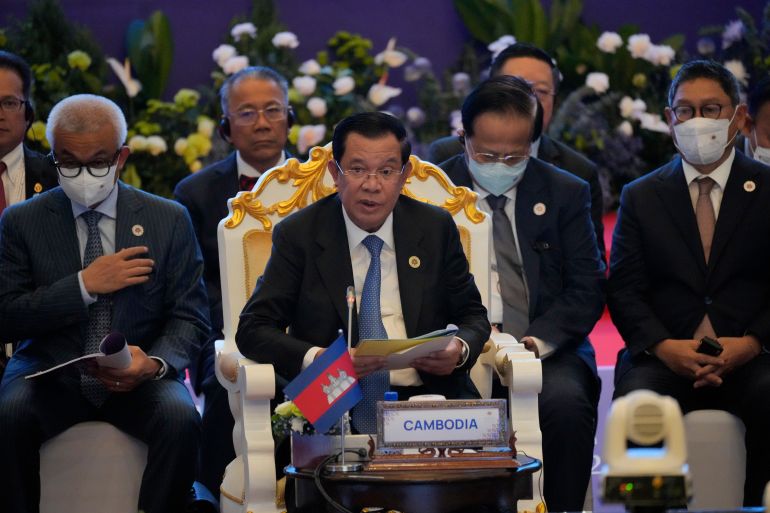Southeast Asian leaders call for unity amid global tensions
Countries eye strained ties between the US and China with major international summits in the Asia-Pacific region.

Cambodia’s Prime Minister Hun Sen has called for unity, respect and multilateralism at a summit that included China, Russia and the United States, saying current global tensions have created hardships for everyone.
Hun Sen was speaking at the opening of the East Asia Summit (EAS), attended by 18 countries, in Phnom Penh as Cambodia holds the rotating chair of the Association of Southeast Asian Nations (ASEAN).
Keep reading
list of 4 itemsUnrest worsens as Myanmar military struggles to consolidate coup
Why is the Myanmar crisis such a challenge for ASEAN?
Biden pledges $150m to ASEAN with eye on China
He said he hoped leaders would embrace a “spirit of togetherness in upholding open and inclusive multilateralism, pragmatism and mutual respect in addressing the existential and strategic challenges we all face”.
While he didn’t single out a country by name, there have been long-simmering tensions between the United States and China, with the latter working to expand its influence in the Asia-Pacific region and Washington strongly backing self-ruled Taiwan, which Beijing claims.
“Many current challenges and tensions have been hindering our past hard-earned efforts to promote sustainable development and causing greater hardship to people’s lives,” he said as he opened the meeting, which is running in parallel to ASEAN’s main summit.
The 10-member ASEAN bloc includes Brunei, Cambodia, Indonesia, Laos, Malaysia, Myanmar, the Philippines, Singapore, Thailand and Vietnam.
The EAS groups the ASEAN countries, as well as Australia, China, India, Japan, New Zealand, South Korea, Russia and the United States.
Tensions remain high between the US and China over Taiwan, while Russia’s invasion of Ukraine disrupted global supply chains, creating food shortages and energy crises around the world.
US President Joe Biden and Chinese Prime Minister Li Keqiang were at the event, a day before the highly anticipated meeting between Biden and Chinese President Xi Jinping at the Group of G20 summit in Bali, Indonesia.
Russian Foreign Minister Sergey Lavrov was present, as were the leaders of Australia, Japan, New Zealand, and South Korea.
Indonesian President Joko Widodo vowed not to let Southeast Asia become the front lines of a new cold war as ties between the US and China become fraught. His country will take over as ASEAN chair in 2023 and he said the bloc would not become “a proxy to any powers”.
Biden promised on Saturday, at an annual meeting between the US and ASEAN, that Washington would work with the Asian bloc, saying: “We’re going to build a better future that we all want to see” and vowing to collaborate to build a region that is “free and open, stable and prosperous, resilient and secure”.
Li told a meeting of ASEAN, China, Japan, and South Korea that amid a “turbulent” global security situation, “unilateralism and protectionism are surging, economic and financial risks are rising, and global development is confronted with unprecedented challenges”.
He also said that as major economies in East Asia, the group needed to “stay committed to promoting peace, stability, development, and prosperity in the region and beyond, and to improving the people’s wellbeing”.
Biden met separately with Japanese Prime Minister Fumio Kishida and South Korean President Yoon Suk Yeol on Sunday to coordinate their response to North Korea’s nuclear and ballistic missile programs, as well as to seek input on managing China’s assertive posture in the Pacific region.
North Korea has fired dozens of missiles in recent weeks, including an intercontinental ballistic missile 10 days ago that triggered evacuation alerts in northern Japan. Allies have warned of the looming risk of the isolated country conducting its seventh nuclear test in the coming weeks.